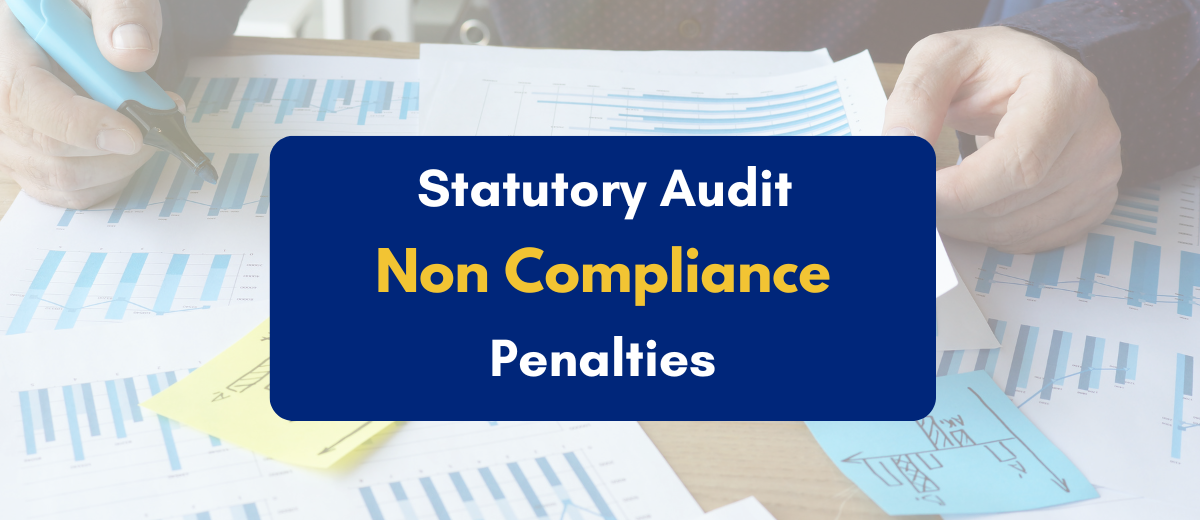A Statutory Audit is not merely a financial review; it is a legal obligation under various corporate and taxation laws in India.
Non-compliance with statutory audit requirements — whether by omission, misreporting, or delay — can attract severe penalties for the company, its directors, and the auditors themselves.
These penalties are outlined in several laws, including the Companies Act, 2013, the Income Tax Act, 1961, and the SEBI (Listing Obligations and Disclosure Requirements) Regulations, among others.
This section details the types of non-compliance, applicable penalties, relevant legal sections, case laws, and best practices to avoid these penalties.
Major Types of Statutory Audit Non-Compliance
| Nature of Non-Compliance | Description |
| Failure to appoint an auditor | Mandatory appointment within 30 days of incorporation or at AGM |
| Failure to file audit reports | Non-filing or delay in submission to ROC or tax authorities |
| Non-compliance by auditor | Misstatements, failure to report fraud, collusion with management |
| Non-conduct of audit altogether | Particularly in unlisted companies, LLPs, and startups |
| Suppression or fabrication of accounts | Intentional misstatement or concealment of material facts |
| Misreporting in tax audit reports | Incorrect reporting under Form 3CA/3CB and Form 3CD |
Penalties Under the Companies Act, 2013
a. Section 139 – Appointment of Auditors
- Default: Company fails to appoint the auditor at the AGM
- Penalty:
- ₹25,000 to ₹5,00,000 on the company
- Officers in default may face imprisonment up to 1 year or fine up to ₹1,00,000 or both
b. Section 143 – Auditor’s Duties & Powers
- If the auditor fails to report fraud or material misstatement:
- ₹25,000 to ₹5,00,000 penalty
- In case of willful neglect or intent to deceive, prosecution under Section 447 (Fraud)
c. Section 147 – Punishment for Contravention
| Particulars | Penalty |
| Company contravenes provisions | Fine between ₹25,000 and ₹5,00,000 |
| Auditor contravenes provisions | Fine between ₹25,000 and ₹5,00,000; imprisonment up to 1 year in severe cases |
| Auditor involved in fraud | Liable under Section 447: Minimum imprisonment 6 months, max 10 years |
| Repetition of default | Disqualification and ban for up to 5 years from being auditor |
Penalties Under the Income Tax Act, 1961
a. Section 44AB – Tax Audit Non-Compliance
- Applicability: For turnover exceeding ₹1 crore (business) or ₹50 lakh (profession)
- Non-compliance Penalty:
- 0.5% of turnover, maximum ₹1,50,000 (Whichever is less)
b. Section 271J – False Tax Report by Auditor
- Fine of ₹10,000 per report for furnishing incorrect information under sections like 44AB, 92E, etc.
c. Section 271B – Delay in Tax Audit Filing
- Same as Section 44AB – 0.5% of turnover, up to ₹1.5 lakh (Whichever is less)
Penalties Under SEBI LODR (for Listed Companies)
a. Regulation 33 & 52 – Submission of Financial Results
- Delay or non-submission of audited financial statements
- Penalty: ₹5,000 per day or ₹10 lakh , whichever is lower
b. Suspension or Delisting
- Repeated non-compliance can lead to stock suspension, trading freeze, or delisting
c. Audit Committee Responsibility
- Failure of audit committee to monitor audit process → Censure and fines on board and KMPs
Role and Responsibility of the Auditor
a. Duty to Report Fraud (Section 143(12))
- If auditor suspects fraud exceeding ₹1 crore, it must be reported to the Central Government
b. Penalty for Collusion or Gross Negligence
- Auditor found guilty of collusion or misconduct →
- Fine up to 4 times audit fees received
- Blacklist by NFRA (National Financial Reporting Authority)
Case Studies and Legal Precedents
Satyam Scam (2009)
- Role of statutory auditor came under scrutiny
- Auditors banned for 8 years, imprisonment under IPC and Companies Act
- Led to formation of NFRA
IL&FS Crisis (2018)
- Auditors found to have failed in flagging financial irregularities
- Show- cause notices issued by MCA and ICAI
- SEBI fined auditors and banned firm from taking new audits for 1 year
National Financial Reporting Authority
NFRA, under the Companies Act Section 132, can:
- Impose monetary penalty:
- Individual auditors: ₹1,00,000 and up to 5 times the audit feesreceived.
- Audit firms: ₹5,00,000 and up to 10 times the audit fees received.
- Debar an auditor from auditing companies for up to 10 years
Consequences for Directors and Management
| Non-Compliance | Consequence |
| Non-appointment of auditor | Personal liability for fines and penalties |
| Suppression of material facts | Imprisonment and penalty under Sections 447 and 448 (fraud, misstatement) |
| Approving false statements | Disqualification from directorship under Section 164(2) |
| Misleading financials in IPOs | SEBI action including ban on capital markets |
Best Practices to Avoid Penalties
✅ Maintain an audit calendar and track due dates
✅ Conduct internal audits before statutory audits
✅ Maintain complete documentation (see Topic 4)
✅ Appoint auditors within prescribed time limits
✅ Disclose all related party transactions transparently
✅ Ensure timely filing of audit reports and financials
✅ Train management on audit compliance obligations
Penalties for non-compliance with statutory audit provisions are not just monetary — they include reputational damage, legal consequences, and restrictions on future business activities.
Auditors and management must work collaboratively to maintain transparency, accuracy, and timeliness in audit procedures. Proactive compliance ensures corporate sustainability, legal safety, and investor trust.

 Expert verified
Expert verified 

